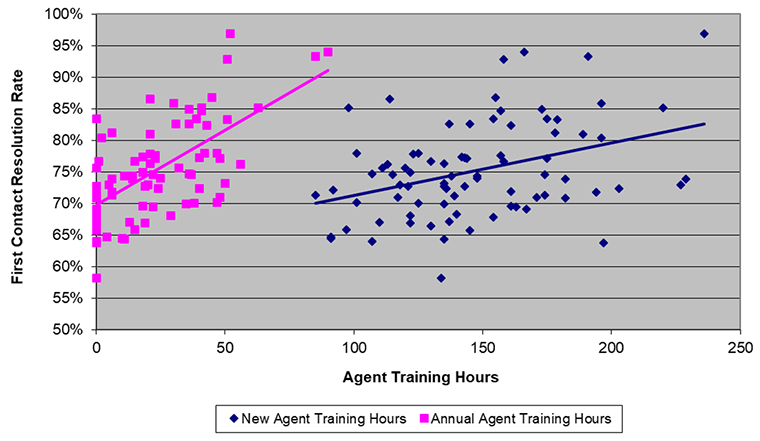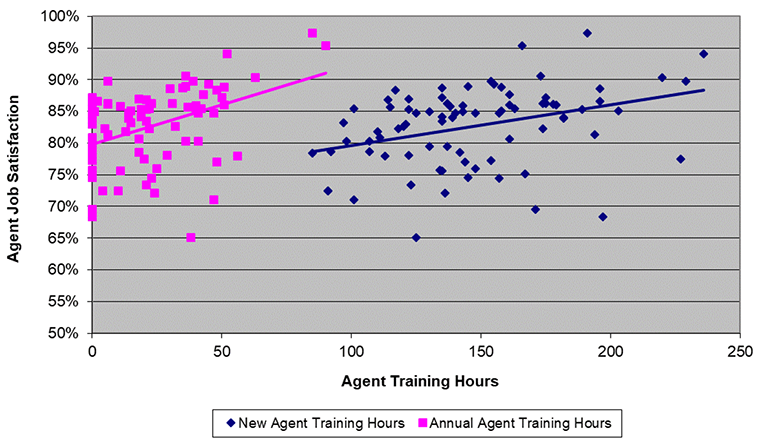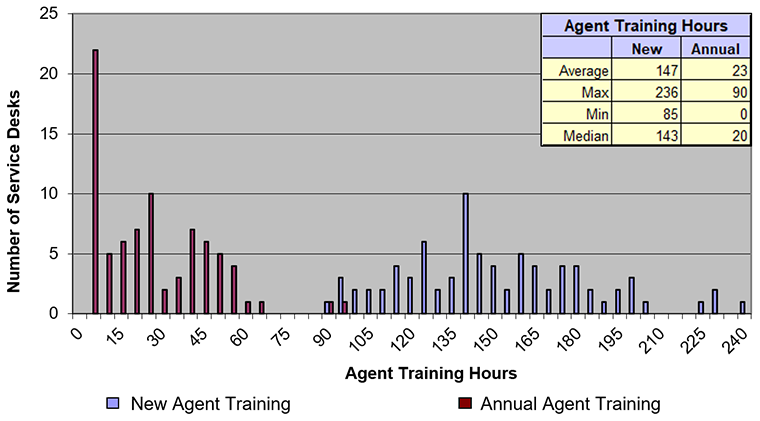Date Published May 29, 2019 - Last Updated December 17, 2019
Each month, I highlight one Key Performance Indicator (KPI) for service and support. I define the KPI, provide recent benchmarking data for the metric, and discuss key correlations and cause-and-effect relationships for the metric. The purpose of the column is to familiarize you with the KPIs that really matter to your organization and to provide you with actionable insight on how to leverage these KPIs to improve your performance! This month, I look at agent training hours.
There are two commonly tracked service desk metrics for agent training: new agent training hours and annual agent training hours. New agent training measures the number of training hours, including classroom, computer-based-training, self-study, direct coaching, and on-the-job training, that a new agent receives before they are allowed to handle customer contacts independently. Annual agent training, by contrast, includes any ongoing training that an agent receives after their new agent training has been completed. Annual agent training does not include routine team meetings, shift handoffs, or other activities that do not involve formal training.Most support organizations will tell you that they don’t do as much training as they would like. The most common reasons cited for the shortfall are budget and time constraints. But given the overwhelmingly positive impact that training can have on an organization, it’s no surprise that the staunchest defenders of the training budget tend to have the best performing support organizations.
Why It’s Important
Agent training is one of the few metrics that a support organization has complete control over. Moreover, it is a preventive/proactive metric because higher training hours are positively correlated with several other important metrics on the service desk. For example, agent training is one of the key drivers of first contact resolution rate (correlated in the figure below). And as we know from prior Metric of the Month articles, first contact resolution is the single biggest driver of customer satisfaction. This is why support organizations looking to improve their customer satisfaction scores will oftentimes increase their agent training hours in a bid to increase first contact resolution rates, which then drives higher customer satisfaction levels.
Agent training is one of the key drivers of first contact resolution rate.


Training hours also have a direct impact on agent job satisfaction, and hence the overall morale of an organization (correlated in the figure below). As many experienced service and support professionals can attest, maintaining good morale in the workforce can be a challenge. Clearly one of the benefits of providing agents with an abundance of training opportunities is that it can help to boost and sustain high levels of agent job satisfaction. This, in turn, has the effect of reducing agent turnover and absenteeism.

Industry Benchmarks for Agent Training
Agent training hours can vary dramatically from one organization to another and from one industry to another. MetricNet’s global benchmarking database shows that the average new agent training is 147 hours (almost four full weeks), and the average annual agent training is 23 hours. These metrics range widely, however, from a low of 85 hours to a high of 236 hours for new agent training, and from a low of 0 hours to a high of 90 hours for annual agent training (represented in the figure below). These large variations are a reflection of each company’s individual training philosophy, as well as the budget and time constraints mentioned above.

Please join me for next month’s Metric of the Month: The ROI of Support, where I will present a methodology for calculating the return on investment for your support organization.
Jeff Rumburg is the winner of the 2014 Ron Muns Lifetime Achievement Award, and was named to HDI’s Top 25 Thought Leaders list for 2016. As co-founder and CEO of MetricNet, Jeff has been retained as an IT service and support expert by some of the world’s largest corporations, including American Express, Hewlett Packard, Coca-Cola, and Sony. He was formerly CEO of the Verity Group and Vice President of Gartner. Jeff received his MBA from Harvard University and his MS in Operations Research from Stanford University. Contact Jeff at
[email protected]
. Follow MetricNet on Twitter @MetricNet.